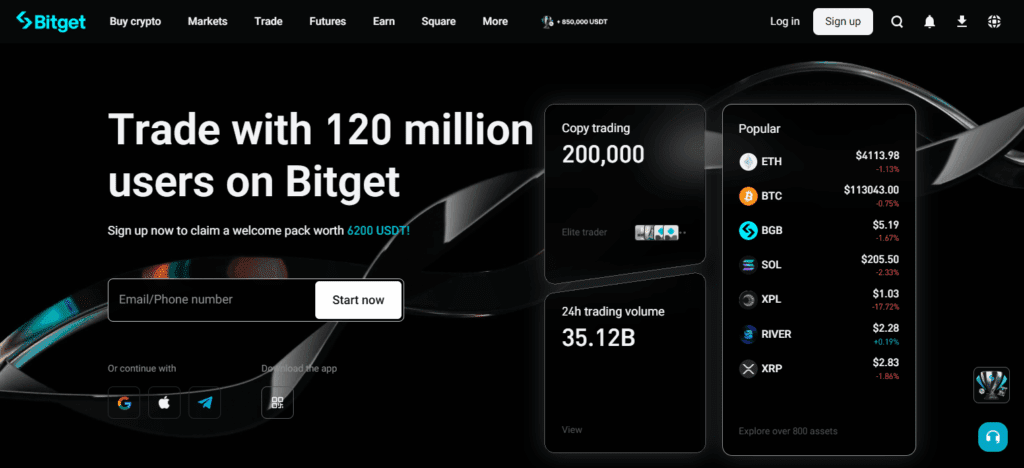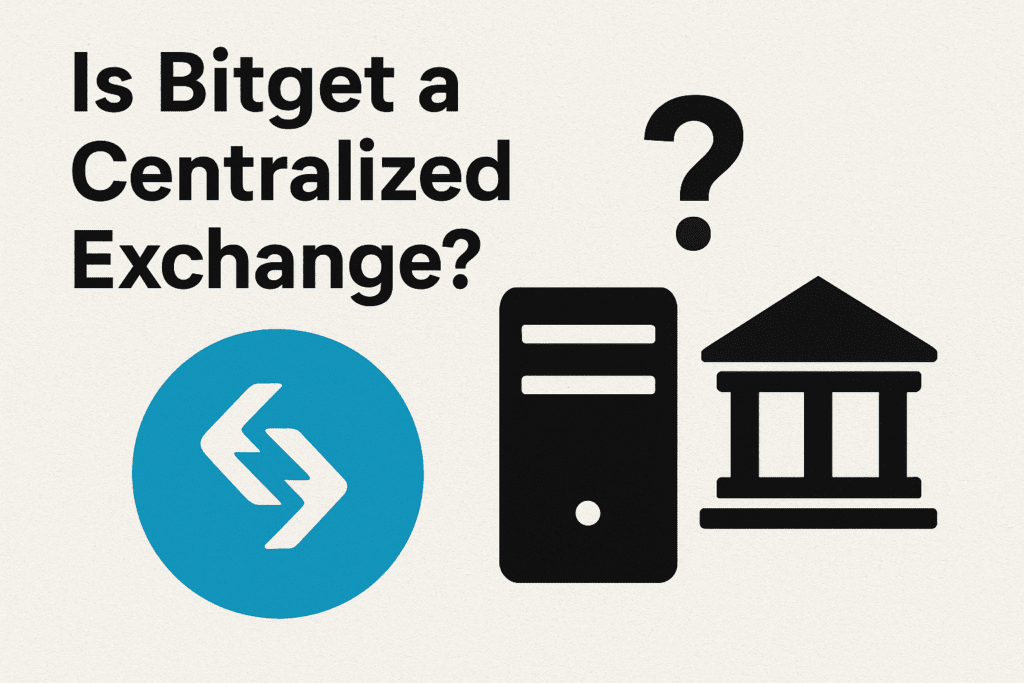Choosing the right platform with clarity helps navigate the crypto market. With an intuitive design, advanced tools, and robust liquidity, Bitget makes an impression. However, many traders wonder, is Bitget a centralized exchange?
Knowing its centralized format helps users make better and more informed choices regarding the trade-offs between ease, safety, and autonomy when weighing the advantages and disadvantages of using a service that manages and stores your funds.
What is Is Bitget?
Bitget caters to customers around the world and lets customers trade a variety of digital currencies across derivatives and spot markets. It offers a simple to use platform and advanced trading solutions which includes copy trading and security.

Along with this, they provide futures trading which attracts many customers. It is a well regarded and comprehensive trading platform which used by traders of all level, and targets the crypto currency market.
Is Bitget a Centralized Exchange?
Yes, Bitget is a centralized exchange (CEX). This means that a company can control the platform, manage accounts, and oversee the custody of users’ funds. In comparison, decentralized exchanges (DEXs) allow users to maintain control of their private keys.

In the case of CEXs, users are required to deposit funds beforehand to engage in trades. Because of its position as a CEX, Bitget is able to provide advanced trading tools, support for margin and futures trading, customer support, and the option to comply with regulations, as opposed to fully decentralized services which can offer none of these features.
Understanding Centralized vs Decentralized Exchanges
Centralized Exchanges (CEX)
Definition. These are the platforms that operate by a company which acts as a middleman, for example, Bitget, Binance, and Coinbase.
Control. The exchange saves users’ funds and maintains the order book.
Advantages. Abundant liquidity, quick transactions, sophisticated trading instruments, and excellent customer service.
Disadvantages. Custodial risk (exchange keeps the funds), compliance with the law (regulations) which can also leave the exchange open to hacks. Limited Privacy.
Decentralized Exchanges (DEX)
Definition. These are the exchanges that allow people to trade without a middleman through smart contracts directly from their wallets, for example, Uniswap or PancakeSwap.
Control. Funds are totally in the control of the users; trade is done without anyone in the middle.
Advantages. Higher levels of privacy, censorship, and control as the funds are wholly in the user’s possession.
Disadvantages. Minimum features can mean slow transaction speed, and beginners can encounter a steep learning curve as there are less trading features.
Key Differences
| Feature | Centralized Exchange (CEX) | Decentralized Exchange (DEX) |
|---|---|---|
| Fund Control | Exchange holds funds | User holds funds |
| Privacy | Low (KYC required) | High |
| Liquidity | High | Often lower |
| Speed & Tools | Fast, advanced tools | Slower, limited tools |
| Risk | Custodial & regulatory risk | Smart contract & liquidity risk |
Advantages of Using Bitget as a Centralized Exchange
User-Friendly Interface
Bitget’s platform is understandable for all types of users, both newbies and expert traders. Its dashboards, charts, and trading order tools are organized, helping users trade efficiently and seamlessly.
High Liquidity
Due to Bitget being a centralized exchange, it pools together a significant volume of buyers and sellers, which means users get their orders filled quickly and with tighter spreads. This feature is great for users that quickly want to enter and exit a trade.
Advanced Trading Tools
Users can diversify the management of their portfolios and the strategies they want to implement with tools like spot trading, futures, copy trading, and leveraged trading.
Enhanced Security Measures
Bitget, like all other centralized exchanges, needs to keep their users’ funds safe, which is done with cold storage, 2 factor authentication, and security audits.
Regulatory Compliance & Support
With regards to customer support and issue resolution, Bitget’s structured KYC and legal compliance makes it easier within the centralized system, unlike decentralized exchanges.
Deposit & Withdrawal Convenience
Users can quickly deposit and withdraw using a variety of both fiat and crypto, thus being able to take advantage of the centralized system.
Educational Resources & Community
Bitget frequently offers community-oriented materials such as tutorials and trading guides. This assists traders in making well-informed trading decisions.
Potential Risks of Centralized Exchanges
Custodial Risk – Centralized exchanges keep users’ funds within their wallets. Users stand to lose their assets indefinitely should the exchange ever get hacked, funds mismanagement, or insolvency.
Regulatory & Legal Risk – Centralized exchanges come under the regulative scrutiny of the local authorities which means sudden legal changes may occur. If governments impose bans, or revocation on licenses, it may lead to account access limitations or account funds being frozen.
Security Vulnerabilities – Centralized systems can put measures to secure their systems, but this will not stop them being targeted by a cyberattack. In fact, large exchanges being hacked is a commonplace occurrence which means users funds and personal details will be exposed to a breach.
KYC Privacy Infringements – Centralized exchanges demand full KYC compliance, and ultimately, they will infringe on users privacy as personal information will be collected compared to decentralized systems.
Platform Downtime – System overloads or maintenance can be prohibitive, forcing users to unwillingly accept losses by not letting them access their funds to trade.
Centralized Control – Decisions which determine account freezing, reversing a transaction, and limiting withdrawals are all made by the exchange directly.
Fees & Hidden Costs – You stand to lose a lot in fees on top of the costs of actually trading as they impose additional fees for withdrawals, deposit, and trading.
Conclusion
To sum up, Bitget is a centralized exchange (CEX) which provides customers a safe, high-liquidity environment for trading digital currencies. Bitget is fast, dependable, and offers superb customer service.
There are advanced trading features and guarantees rapid completion of transactions. However, as a CEX, it has custodial and regulatory risks which mean the users of the platform trusting it to handle their money with due care.
FAQ
Bitget is a centralized exchange (CEX) where the platform holds users’ funds and manages trading operations.
Bitget implements robust security measures like cold storage, two-factor authentication (2FA), and regular audits, but users should be aware of custodial risks inherent to centralized exchanges.
Bitget requires KYC for full access, including higher withdrawal limits and compliance with regulations.
Advantages include high liquidity, fast order execution, advanced trading tools, and responsive customer support.
Risks include custodial risk, regulatory restrictions, potential hacks, and limited privacy compared to decentralized exchanges.













Got a Questions?
Find us on Socials or Contact us and we’ll get back to you as soon as possible.